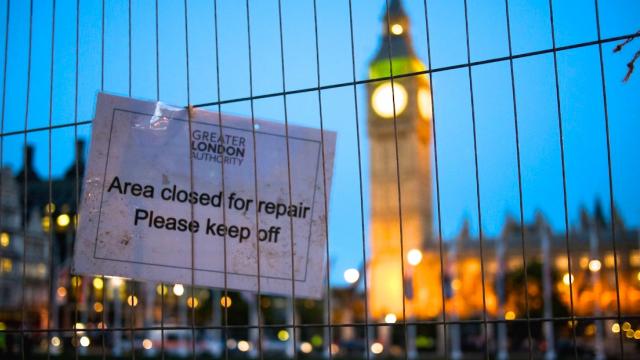
You can tell a lot about the moral quality of a society by what is, and is not, considered news.
From last Tuesday, Parliament Square was wrapped in wire mesh. In one of the more surreal scenes in recent British political history, officers with trained German shepherds stand sentinel each day, at calculated distances across the lawn, surrounded by a giant box of fences, three meters high – all to ensure that no citizen enters to illegally practice democracy. Yet few major news outlets feel this is much of a story.
Occupy Democracy, a new incarnation of Occupy London, has attempted to use the space for an experiment in democratic organizing. The idea was to turn Parliament Square back to the purposes to which it was, by most accounts, originally created: a place for public meetings and discussions, with an eye to bringing all the issues ignored by politicians in Westminster back into public debate. Seminars and assemblies were planned, colorful bamboo towers and sound systems put in place, to be followed by a temporary library, kitchen and toilets.
There was no plan to turn this into a permanent tent city, which are now explicitly illegal. True, this law is very selectively enforced; Metropolitan police regularly react with a wink and a smile if citizens camp on the street while queuing overnight for the latest iPhone. But to do it in furtherance of democratic expression is absolutely forbidden. Try it, and you can expect to immediately see your tent torn down and if you try even the most passive resistance you’re likely to be arrested. So organizers settled on a symbolic 24-hour presence, even if it meant sleeping on the grass under cardboard boxes in the autumn rain.
The police response can only be described as hysterical. Tarpaulins used to sit on the grass were said to be illegal, and when activists tried to sit on them they were attacked by scores of officers. Activists say they had limbs twisted and officers stuck thumbs into nerve endings as “pain compliance.” Pizza boxes were declared illegal structures and confiscated and commanders even sent officers to stand over activists at night telling them it was illegal to close their eyes.
Finally, the fences went up, and the guard dogs appeared – ostensibly, for what officers insisted was scheduled cleaning that happened to continue each day of the occupation. Hundreds of participants were thus pushed into the tiny green strip to the north of the Churchill statue, and even then, it seemed like every time they sat down for a seminar on financial reform or planning a response to the housing crisis, they were interrupted by some new pretext for police intervention – someone had an “illegal” megaphone, there was what looked like camping equipment, some regulation might have been violated – and squads of police once again stormed in.
One could speak of many things here: the obvious embarrassment of the police, compared with the perseverance and cheerful good humor of the occupiers, who continually grew in numbers and spirit as the repression increased. But what I really want to talk about is the reaction of the media.
The reason that park occupations are so important is because everyone knows they are there. Activists constantly hear the same refrain from would-be allies: “I agree that there’s been an erosion of democracy in this country, that the money controls everything, what I don’t know is: what can I do?” Our usual reply is: meet with other like-minded people. When people get together, brilliant ideas invariably emerge. But it’s impossible to bring people together unless there is a location, a place where they can always go, 24/7, to meet people and begin to have conversations and make plans. This is precisely what our political authorities have decided that Londoners must never again be allowed to have.
To achieve this, the police and media must take what are ostensibly completely opposite reactions to any occupation. The police act as if the possibility of non-violent camping is an existential threat to the very idea of civil government; hundreds of police are mobilized in a near-panic reaction; hallowed public spaces are shut off.
Official media, on the other hand – and in this case the BBC and mainstream newspapers are acting as if they were an arm of government – take exactly the opposite approach, insisting that the events in question are so trivial and unimportant that there is no need to cover them at all. The very same press that provides wall-to-wall coverage of pro-democracy occupations and police repression halfway around the world, in Hong Kong, acts as if analogous events at home are of no interest.
It’s hard to think of a more dramatic story than battles between police and non-violent protesters, or the erection of giant fences and mobilization of attack dogs directly beneath the mother of all parliaments. Yet while I was in the square, the only TV cameras I saw were being carried by journalists from Iran, Russia and Qatar.
We need to ask ourselves what it means that police suppression of democratic assemblies is no longer considered news. Is the wall of silence, as most activists suspect, simply a continuation of the actual physical wall surrounding Parliament Square, another piece of the same strategy, or is it a token of ultimate cynicism? Britons no longer have the right to freedom of assembly. Sorry, that’s no longer news.
3 WAYS TO SHOW YOUR SUPPORT
- Log in to post comments












